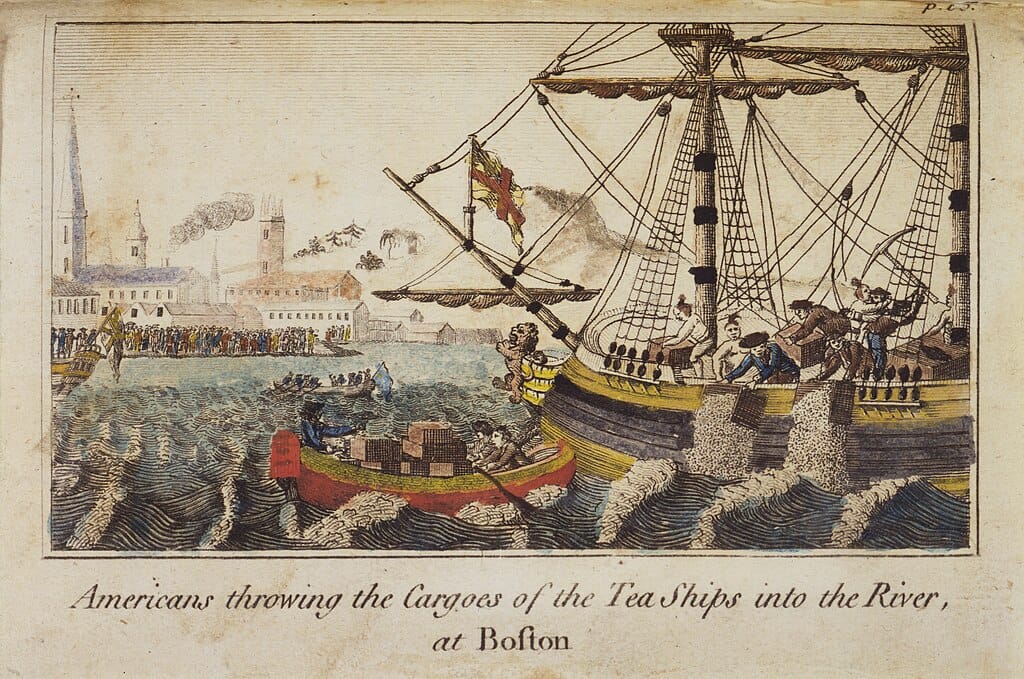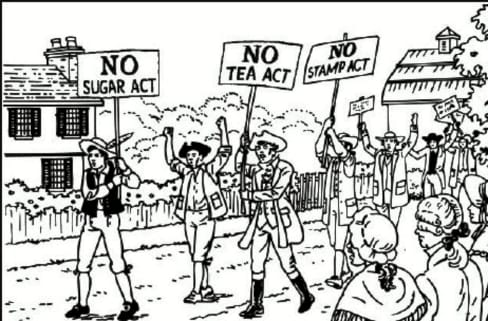What Was the Real Purpose of the Boston Tea Party?
One cold December night in 1773, some American colonists secretly boarded British ships anchored in Boston Harbor. Disguised as Mohawk Indians, they opened 342 chests of tea and dumped them in the sea.
But the question is–why?
Was it just a protest against the taste of tea? Absolutely Not.
It was a deliberate rebellion–a strong stand against British control, unfair taxes and the economic pressure of the East India Company. Let’s understand why these people did this and how this story of a small night turned into a complete revolution.

A Protest Against “Taxation Without Representation”
Voice against “Taxation Without Representation”
The real sentiment of the Boston Tea Party was in just one powerful line:
“No taxation without representation.”
Till the 1770s, the tension between Britain and the American colonies was at its peak. The British Parliament was taxing colonists but they had no voice there. Laws like the Stamp Act and Townshend Acts had already increased the anger. But when the Tea Act of 1773 came, everyone’s patience ended.
The funny thing was that the Tea Act had made tea a lawless thing.
But the twist was this: it confirmed Britain’s right to levy taxes without the colonists’ permission.
That is, it was not a money issue–it was a question of dignity and rights.
Taking tea from the colonists meant obeying the British order.
So they said–NO.
This was not a prank. This was a civil disobedience–a fight for a political right.
Fighting Back Against the East India Company Monopoly
One thing that people often forget: The East India Company had a big role.
The Tea Act did not just allow the shipping of tea—it gave the East India Company exclusive rights. Colonial merchants were sidelined.
This was a monopoly.
Its impact?
- It threatened colonial independence in trade.
- It hurt local merchants–especially smugglers–who imported cheaper Dutch tea.
- It symbolized British economic control over American lives.
For the colonists, this was not just a matter of government—it was a question of survival.
Throwing tea into the sea was a way of saying: “We want control over our economy. We want our rights.”
Whether it was a tax or not, this protest was the beginning of a new thinking.
And that same thinking became the foundation of the American Revolution.“
The Economic Blow to Local Merchants
Imagine if you were a merchant in Boston in 1773. You would have made your living by smuggling Dutch tea, keeping prices low while avoiding British taxes.
Then comes the Tea Act. Suddenly, British tea becomes cheap, legal, and comes under government protection.
This wasn’t just unfair—it was ruinous.
The purpose of the Boston Tea Party was personal for many people. This protest was to save their jobs. If British tea had entered American markets, even at a discount, families would have gone bankrupt and the hard work of salons would have been wasted.
The colonists weren’t just fighting against taxes—they were fighting to protect their economy and identity.
A Defining Moment on the Road to Revolution
The Boston Tea Party was not an impulsive outrage. The Sons of Liberty had carefully planned—they were radical patriots who stood up to British rule.
On December 16 1773, they took action.
In the darkness of the night, they dumped more than 92,000 pounds of tea into the harbor. Its value today? Approximately $1.7 million.
But the colonists weren’t thinking about money. Their message was clear: “We will not be ruled without our consent”.
The British reaction was sharp and strong. The Parliament passed the Coercive Acts—which the Americans called the “Intolerable Acts”—and closed down Boston Harbor and tightened control over Massachusetts.
But while their aim was to crush the rebellion, this step united the colonies even more.
At this moment, the colonists realized—this was not just a tax issue. This was a fight for freedom.
“This is the most magnificent movement of all.”
— John Adams, on the night of the Boston Tea Party
So… What Was the Real Purpose of the Boston Tea Party?
It was not about tea. Really.
The Boston Tea Party was a protest against British taxation, an opposition to an economic monopoly and a stand for self-governance.
It was a right to raise one’s voice, the right to trade freely and to stand up against an empire that had crossed its limits.
What did the colonists want?
- Challenge “taxation without representation”
- Protect local merchants and economies
- Reject the East India Company monopoly
- Inspire collective resistance across the colonies
And yes, they achieved it.
A single event awakened an entire continent and paved the way for a war. In the coming years, “tea” became a symbol of freedom. And Boston Harbor, where once the chests of tea were heaving, became the symbol of a revolution.
Final Thoughts
The purpose of the Boston Tea Party was not just policy—it was all about principle. It was a rebellion that was not filled with anger but determination.
When the colonists waged a war over tea, they hit the center of British economic and political control. And by this very act, they changed history.
The next time you pick up a cup of tea, think about that night when tea became not just a drink but a symbol of courage.

